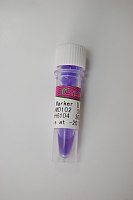Reduction of Shadow Band Synthesis During PCR Amplification of Repetitive Sequences from Modern and Ancient DNA
互联网
448
Repetitive sequences like short tandem repeat (STR) loci are generally referred to as slippery DNA (1 ). They owe this nickname to a characteristic leading to slippage within the primer-template complex during PCR elongation of the new strand (2 ,3 ), resulting in the synthesis of byproducts shortened by one repeat unit compared with the original sequence. The generation of these so-called shadow bands (4 ) is a well-known problem connected with the amplification of repetitive DNA, complicating the genotype analysis of modern (e.g., ref. 5 ), forensic (6 ), and ancient (7 ,8 ) specimens. In some applications, the occurrence of this artifact makes it necessary to develop guidelines for allele designation (6 ,9 ).









